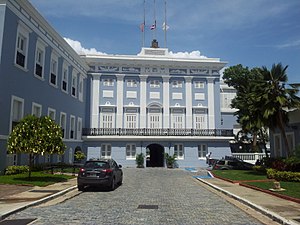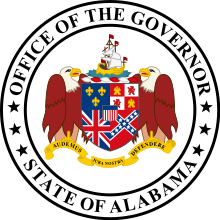Portal:Politics
| Main | Topics and categories | Tasks and projects |
The Politics portal
Politics (from Ancient Greek πολιτικά (politiká) 'affairs of the cities') is the set of activities that are associated with making decisions in groups, or other forms of power relations among individuals, such as the distribution of status or resources. The branch of social science that studies politics and government is referred to as political science.
Politics may be used positively in the context of a "political solution" which is compromising and non-violent, or descriptively as "the art or science of government", but the word often also carries a negative connotation. The concept has been defined in various ways, and different approaches have fundamentally differing views on whether it should be used extensively or in a limited way, empirically or normatively, and on whether conflict or co-operation is more essential to it.
A variety of methods are deployed in politics, which include promoting one's own political views among people, negotiation with other political subjects, making laws, and exercising internal and external force, including warfare against adversaries. Politics is exercised on a wide range of social levels, from clans and tribes of traditional societies, through modern local governments, companies and institutions up to sovereign states, to the international level.
In modern nation states, people often form political parties to represent their ideas. Members of a party often agree to take the same position on many issues and agree to support the same changes to law and the same leaders. An election is usually a competition between different parties.
A political system is a framework which defines acceptable political methods within a society. The history of political thought can be traced back to early antiquity, with seminal works such as Plato's Republic, Aristotle's Politics, Confucius's political manuscripts and Chanakya's Arthashastra. (Full article...)
Selected article
An Introduction to Animals and Political Theory is a 2010 textbook by the British political theorist Alasdair Cochrane. It is the first book in the publisher Palgrave Macmillan's Animal Ethics Series, edited by Andrew Linzey and Priscilla Cohn. Cochrane's book examines five schools of political theory—utilitarianism, liberalism, communitarianism, Marxism and feminism—and their respective relationships with questions concerning animal rights and the political status of (non-human) animals. Cochrane concludes that each tradition has something to offer to these issues, but ultimately presents his own account of interest-based animal rights as preferable to any. His account, though drawing from all examined traditions, builds primarily upon liberalism and utilitarianism.
Featured picture

Xi Jinping (pronounced [ɕǐ tɕînpʰǐŋ], Chinese: 习近平; born 15 June 1953) is the General Secretary of the Communist Party of China, China's "paramount leader".
Selected quote
Selected biography
David Lewis (1909–1981) was a Russian-born Canadian Rhodes Scholar, labour lawyer and social democratic politician. He was national secretary of the Co-operative Commonwealth Federation from 1936 to 1950. As the United Steelworkers of America’s legal counsel in Canada, he played a central role in the creation of the Canadian Labour Congress in 1956 and in the New Democratic Party (NDP)'s formation in 1961. In 1962, he was elected as a Member of Parliament. He was the NDP's leader from 1971 to 1975. After his defeat in the 1974 Canadian election, he retired from politics. He spent his last years as a university professor and a newspaper travel correspondent. In retirement, he was named to the highest level of the Order of Canada for his political service. After a lengthy battle with cancer, he died in 1981.
Did you know (auto-generated) -

- ... that Americans received nearly 15 billion political text messages in 2022?
- ... that Liz Shore's nomination to be Chief Medical Officer of the United Kingdom was vetoed by Margaret Thatcher because of Shore's husband's political affiliation?
- ... that Kim E. Nielsen trained as a historian of women and politics, and came to disability history and studies via her discovery of Helen Keller's political life?
- ... that Iraqi poet Kazim al-Samawi spent more than half his life in political exile and was called "The Sheikh of the Exiles"?
- ... that an excavation for 75 Wall Street revealed an old crock linked with a leader of the Tammany Hall political machine?
- ... that María Elva Pinckert, motivated by the murder of her brother, started her political career in local politics in 1999?
More did you know...
- ...that the 2010 Bihar legislative assembly election takes place across six phases and over one month?
- ...that the National Assembly of Azerbaijan was the first secular republican parliament in the Muslim world?
- ...that in world-system theory, sociologists debate whether two world-systems have ever existed during the same period?
- ...that former Republican California State Senator Becky Morgan served on the Board of Trustees of both her alma maters, Stanford University and Cornell University?
- ...that Nunez Community College in Chalmette, Louisiana, is named for the late wife of former Louisiana State Senate President Samuel B. Nunez, Jr.?
- ...that tiao-kuai is the quasi-federal administration system in China?
In this month
- January 1, 1912 – The Republic of China was proclaimed.
- January 4, 2011 – Tunisian street vendor Mohamed Bouazizi dies after setting himself on fire a month earlier, sparking anti-government protests in Tunisia and later other Arab nations. These protests become known collectively as the Arab Spring.
- January 5, 1912 – Vladimir Lenin and the Bolshevik Party break away from the rest of the Russian Social Democratic Labour Party.
- January 12, 1729 – Edmund Burke was born, considered to be the philosophical founder of modern conservatism.
- January 25, 2006 – Hamas wins a victory in the Palestinian legislative election, taking 76 of the 132 seats.
News and Current events
- August 11: 4 local government areas in New South Wales, Australia locked down after COVID-19 case
- August 11: Australia: AstraZeneca vaccine access expanded by Victorian government
- August 1: Australia: Victorian lockdown lifted
- July 29: Tunisia's president dismisses prime minister, suspends parliament
- July 25: Australia: Wikinews interviews Reg Kidd, mayor of the City of Orange, about COVID-19 lockdown and local government
- July 23: South Australia enters week-long lockdown to contain COVID-19 Delta variant spread
- July 21: Technological University Dublin senior lecturer Dr Lorcan Sirr speaks to Wikinews on housing market in Ireland
- July 21: Three rural councils in New South Wales, Australia enter 7-day lockdown
- July 21: Australia: Victoria lockdown extended by a week with 85 active cases recorded
- July 15: California governor signs new state budget, eligible Californians to get stimulus payments
Topics and categories
General images
Related portals
Associated Wikimedia
The following Wikimedia Foundation sister projects provide more on this subject:
-
Commons
Free media repository -
Wikibooks
Free textbooks and manuals -
Wikidata
Free knowledge base -
Wikinews
Free-content news -
Wikiquote
Collection of quotations -
Wikisource
Free-content library -
Wikiversity
Free learning tools -
Wiktionary
Dictionary and thesaurus

























































